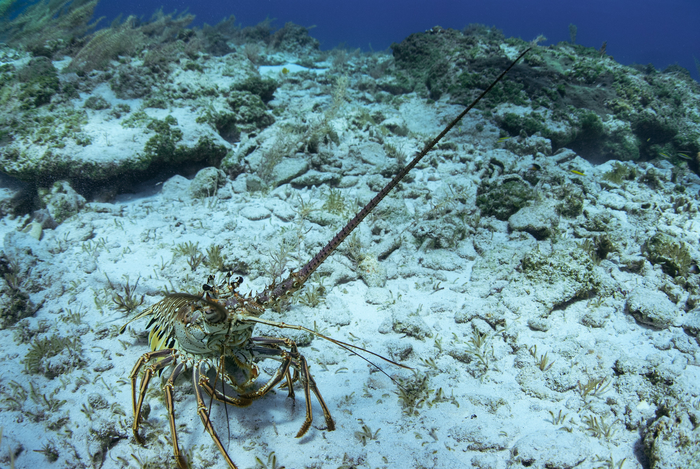A new project will help to ensure sustainable fishing and aquaculture (fish farming) of Caribbean spiny lobsters.

Credit: Michael Bowleg
A new project will help to ensure sustainable fishing and aquaculture (fish farming) of Caribbean spiny lobsters.
Through a series of ground-breaking innovations, researchers at the University of Exeter are seeking to improve the management and conservation of this iconic species, which through fishing is worth $90 million per year to the economy in The Bahamas.
As part of this two-year project, researchers will firstly build a “genetic tool” that will enable analysis of lobster population genetics and connectivity.
Working with local fishers, the team will then trial the latest aquaculture technology for sustainably farming lobster in The Bahamas and across the wider Caribbean.
Finally, this project will work with key government stakeholders in The Bahamas to devise a policy for future sustainable exploitation of this critically important organism.
The project has received a $250,000 (£215,000) financial support for its close to two-year pilot in The Bahamas after being selected as one of 10 new innovators for the UNDP Ocean Innovation Challenge call for innovative sustainable fisheries and aquaculture solutions.
The team brings together key global expertise, working with the UK’s National Lobster Hatchery and the Cape Eleuthera Institute (CEI) at The Island School in The Bahamas, to ensure this seafood sector has a bright and sustainable future.
“The Caribbean spiny lobster fishery is economically and ecologically important, but 36% of all lobsters caught at present are unregulated,” said Dr Robert Ellis, from the University of Exeter.
“From studying other spiny lobster species globally, we know that when they are over-fished their numbers crash, having dramatic effects on the ecosystems they are part of.
“We will develop a new genetic tool based on population structure data for Caribbean spiny lobster and its connectivity across the region, contributing to the critical sustainable management of wild stocks and stock enhancement programmes.
“These innovations will create a multi-disciplinary and participatory approach to enhancing the sustainable exploitation of this fishery, using The Bahamas as a model of best practice.”
The University of Exeter will also engage with fishing communities and policymakers to raise their awareness of the importance of this fishery, the conservation challenges it faces, and the need to sustain science- and aquaculture-based solutions to ensure long-term ecological and socio-economic benefits to The Bahamas and the Caribbean.
”In The Bahamas we produce about 2,400 tonnes of spiny lobster annually but this is entirely based on wild-caught fisheries. This project will not only help sustainably manage that fishery but will help lay the groundwork for a novel aquaculture approach to growing this sector,” Dr Nick Higgs, from The Island School at CEI.




